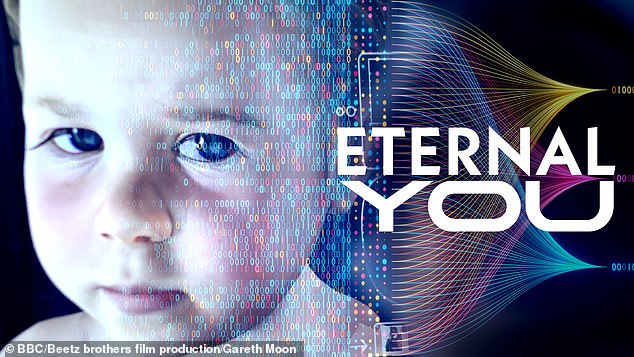Back in 2012, Canadian freelance writer Joshua Barbeau tragically lost his fiancée, Jessica, when she succumbed to a rare liver disease.
Eight years later and still struggling with his grief, Barbeau came across a curious website called Project December, billed as ‘the world’s most super computer’.
Powered by an early version of OpenAI’s ChatGPT, for just $5, Project December let him recreate an AI version of Jessica if he typed in details of what she had been like.
After typing ‘Jessica?’, the AI version of his deceased girlfriend told him: ‘I miss you every single day’ and ‘I am the girl that you are madly in love with.’
Speaking on a new BBC documentary ‘Storyville: Eternal You’, Barbeau, now 36, found the eerie tech ‘uncannily’ similar to his loved one.
He says: ‘It really felt like a gift, like a weight had been lifted that I had been carrying for a long time.’
Now, Project December is one of several online services powered by AI that can create ‘replicas’ of lost loved ones.
Experts warn that the controversial Black Mirror style tech doesn’t help the grieving process, instead capitalising on emotions of people finding it hard to say goodbye.
In 2012, Canadian freelance writer Joshua Barbeau tragically lost his girlfriend Jessica when she succumbed to a rare liver disease. The couple are pictured

‘Storyville: Eternal You’ interviews the people who try to resurrect their deceased loved ones in order to talk to them
Project December was created by video games designer Jason Rohrer, who was given access to what was then a virtually unknown AI platform called ChatGPT-2.
This was the precursor to OpenAI’s ChatGPT-3, which took the world by storm last year.
Rohrer had not initially anticipated people using Project December to regenerate dead loved-ones.
But since then the site has rebilled itself as letting people ‘simulate the dead’.
Jason tells the BBC: ‘You’re kind of connecting with this computer system and as you interact with it you slowly discover that there’s these conscious entities lurking there that you can talk to through text.’
Now, anyone who heads to the Project December site has to submit a bevy of information about their deceased loved-one.
This includes, but is not limited to, name, year of birth, year of death, cause of death, final residence, personality traits, and a quote describing themselves in their own words.
After completing the form below and submitting payment, the ‘custom personality’ will be generated and sent by email.

Project December was billed as ‘the world’s most super computer’. Now its selling point is letting people ‘simulate the dead’

Project December is one of several online services powered by AI that can create ‘replicas’ of lost loved ones
For $10 (nearly £8), the user will get over 100 back-and-forth exchanges – meaning they will have to keep paying if they want conversations to continue.
Another Project December user, Christi from New York, had lost her close friend Cameroun to liver failure in 2020.
Due to Covid, she was only able to attend his funeral via FaceTime, so she inputted Cameroun’s details to have another ‘conversation’ with him.
But Christi was left distressed when the chat took a dark turn.
The AI approximation of her dearest friend told her he was ‘in hell’ and threatened to ‘haunt’ her, leaving her terrified.
She said: ‘I just pushed the computer back because that scared me – I believe in God, I’m a Christian, so I believe people can get possessed.’
The creepy experience has drawn comparisons to an episode of British TV series Black Mirror where a woman uses a mysterious new AI service to recreate her deceased partner.
As it stands, real-life technology is not as advanced as the episode, where an AI-powered humanoid, played by Domhnall Gleeson, looks imperceptible from the real boyfriend.

Experts warn that the controversial Black Mirror style tech doesn’t help the grieving process, instead capitalising on the emotions of people who can’t say goodbye. In the 2013 Black Mirror episode ‘Be Right Back’, a woman brings her boyfriend ‘back to life’ using a creepy AI service. As it stands, real-life technology is not as advanced as the Black Mirror episode, where an AI-powered humanoid robot of looks imperceptible from the real thing

Another Project December user, Christi from New York (pictured), lost her close friend Cameroun to liver failure in 2020
‘Storyville: Eternal You’ also investigates HereAfter AI, another service that uses generative AI to approximate a dead person’s voice.
It shows an American family gathered around a computer as a synthesized version of their grandfather Bill’s voice emits from the speakers, speaking new words.
In one of the more upsetting scenes, a woman in South Korea sees a digital avatar likeness of her young deceased daughter, as tears drip under her VR mask.
American sociologist and psychologist Sherry Turkle called so-called AI ‘grief tech’ an ‘experiment on ourselves about the most intimate, important matters’.
‘Where social media was 10 years ago, that’s where we are with artificial intelligence now,’ she tells the BBC.
‘We have an amazing technology and we’re totally ‘gee whizz’ [about it].
‘But we have an opportunity to ask ourselves the questions that engineers tend not to ask, which is ‘What are the human purposes and values this is serving?’
‘Storyville: Eternal You’ is available to watch on BBC iPlayer
By Daily Mail Online, October 30, 2024












